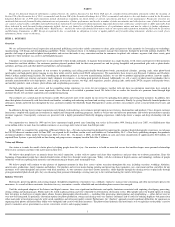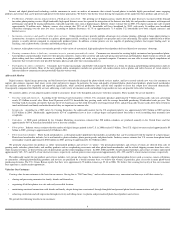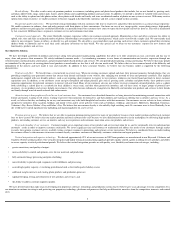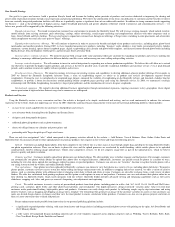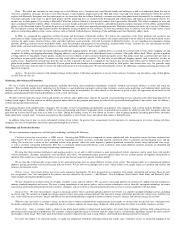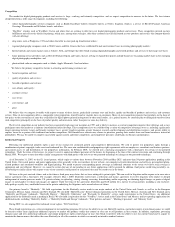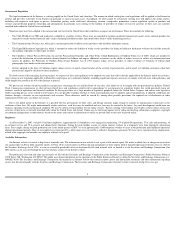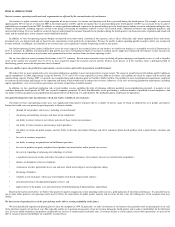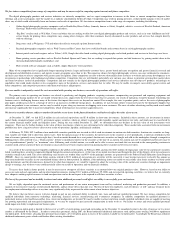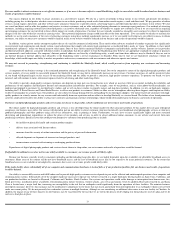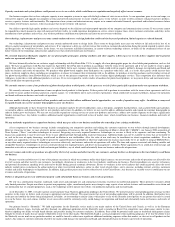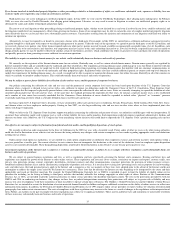Shutterfly 2008 Annual Report Download - page 13
Download and view the complete annual report
Please find page 13 of the 2008 Shutterfly annual report below. You can navigate through the pages in the report by either clicking on the pages listed below, or by using the keyword search tool below to find specific information within the annual report.
Government Regulation
The legal environment of the Internet is evolving rapidly in the United States and elsewhere. The manner in which existing laws and regulations will be applied to the Internet in
general, and how they will relate to our business in particular, is unclear in many cases. Accordingly, we often cannot be certain how existing laws will apply in the online context,
including with respect to such topics as privacy, defamation, pricing, credit card fraud, advertising, taxation, sweepstakes, promotions, content regulation, quality of products and
services and intellectual property ownership and infringement. In particular, laws relating to the liability of providers of online services for activities of their users are currently
unsettled both within the United States and abroad.
Numerous laws have been adopted at the national and state level in the United States that could have an impact on our business. These laws include the following:
To resolve some of the remaining legal uncertainty, we expect new laws and regulations to be adopted over time that will be directly applicable to the Internet and to our activities.
Any existing or new legislation applicable to Shutterfly could expose us to substantial liability, including significant expenses necessary to comply with such laws and regulations, and
could dampen the growth in the use of the Internet in general.
We post on our website our privacy policies and practices concerning the use and disclosure of user data. Any failure by us to comply with our posted privacy policies, Federal
Trade Commission requirements or other privacy-
related laws and regulations could result in proceedings by governmental or regulatory bodies that could potentially harm our
business, results of operations and financial condition. In this regard, there are a large number of legislative proposals before the United States Congress and various state legislative
bodies regarding privacy issues related to our business. It is not possible to predict whether or when such legislation may be adopted, and certain proposals, if adopted, could harm our
business through a decrease in user registrations and revenues. These decreases could be caused by, among other possible provisions, the required use of disclaimers or other
requirements before users can utilize our services.
Due to the global nature of the Internet, it is possible that the governments of other states and foreign countries might attempt to regulate its transmissions or prosecute us for
violations of their laws. We might unintentionally violate such laws, such laws may be modified and new laws may be enacted in the future. Any such developments could harm our
business, operating results and financial condition. We may be subject to legal liability for our online services. The law relating to the liability of providers of these online services for
activities of their users is currently unsettled both within the United States and abroad. Claims may be threatened against us for aiding and abetting, defamation, negligence, copyright
or trademark infringement, or other theories based on the nature and content of information to which we provide links or that may be posted online.
Employees
As of December 31, 2007, we had 431 full time employees. Approximately 124 employees were engaged in engineering, 179 in photo lab operations, 57 in sales and marketing, 16
in customer service and 55 in general and administrative functions. During the peak holiday season, we obtain contract workers on a temporary basis from third-
party outsourcing
firms. For example, during our peak production day in the fourth quarter of 2007, we used approximately 1,000 temporary workers to assist in our production and fulfillment operations
during high-demand periods. None of our employees is represented by a labor union or is covered by a collective bargaining agreement. We have never experienced any employment-
related work stoppages and consider our employee relations to be good.
Available Information
Our Internet website is located at http://www.shutterfly.com. The information on our website is not a part of this annual report. We make available free of charge on our website
our annual report on Form 10-K, quarterly reports on Form 10-Q, current reports on Form 8-
K and amendments to those reports filed or furnished pursuant to Section 13(a) or 15(d) of
the Securities Exchange Act of 1934, as soon as reasonably practicable after we electronically file such material with, or furnish it to, the Securities and Exchange Commission. Our
SEC reports can be accessed through the investor relations section of our Internet website.
The public may also read and copy any materials we file with the Securities and Exchange Commission at the Securities and Exchange Commission’
s Public Reference Room at
100 F Street, NE, Washington, DC 20549. The public may obtain information on the operation of the Public Reference Room by calling the Securities and Exchange Commission at 1-
800-SEC-
0330. The Securities and Exchange Commission also maintains an Internet website that contains reports, proxy and information statements and other information regarding
issuers that file electronically with the Securities and Exchange Commission. The Securities and Exchange Commission’s Internet website is located at http://www.sec.gov.
•
The CAN-SPAM Act of 2003 and similar laws adopted by a number of states. These laws are intended to regulate unsolicited commercial e-
mails, create criminal penalties for
unmarked sexually
-
oriented material and e
-
mails containing fraudulent headers and control other abusive online marketing practices.
•
The Communications Decency Act, which gives statutory protection to online service providers who distribute third
-
party content.
•
The Digital Millennium Copyright Act, which is intended to reduce the liability of online service providers for listing or linking to third-
party websites that include materials
that infringe copyrights or other rights of others.
•
The Children’
s Online Privacy Protection Act and the Prosecutorial Remedies and Other Tools to End Exploitation of Children Today Act of 2003, which are intended to
restrict the distribution of certain materials deemed harmful to children and impose additional restrictions on the ability of online services to collect user information from
minors. In addition, the Protection of Children From Sexual Predators Act of 1998 requires online service providers to report evidence of violations of federal child
pornography laws under certain circumstances.
•
Statutes adopted in the State of California require online services to report certain breaches of the security of personal data, and to report to California consumers when their
personal data might be disclosed to direct marketers.
9



